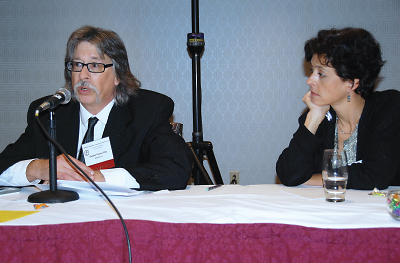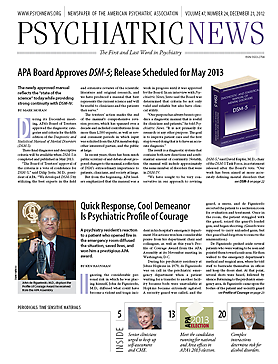False confessions occur too frequently in the criminal-justice system, and individuals with diminished mental capacity are particularly vulnerable to techniques that police use during interrogations, said panel members at the American Academy of Psychiatry and the Law meeting in Montreal in October.
A study of the Innocence Project’s database found that 40 of the 250 cases assessed involved false confessions by the accused, said Gregory DeClue, Ph.D., a forensic psychologist in Sarasota, Fla. “Of those, 95 percent gave detailed confession statements about the crimes,” said DeClue. “The only plausible source of that inside information was the police, during the interrogation.”
Police divide questioning of subjects into two groups, said panelist Peter Dell, M.D., a forensic psychiatrist in private practice in Santa Monica, Calif. In an “interview,” the person is not presumed guilty by the police. An “interrogation” implies that the police believe the person is in fact guilty, and the goal is thus to get a confession.
“We don’t interrogate innocent people,” one officer told Dell.
In the United States, several manipulative techniques are permissible in interrogations, he said.
“It’s OK to lie, to give the suspect false evidence, or to suggest that phony ‘test’ results have proven guilt,” he said. “Only physical intimidation and use of force are illegal.”
Many groups are especially vulnerable to police influence during an interrogation, said DeClue: young people and individuals with cognitive deficits, poor education, memory problems, language barriers, and some medical conditions.
Also, people with psychosis, anxiety, depression, or substance intoxication or withdrawal are especially vulnerable, he stated.
Yet another group could be drawn from almost every segment of society, said Dell—namely, those lacking experience with the criminal-justice system. “There’s a false perception that we live in a just world and that our innocence is visible,” said Dell. “That is not true.”
Dell surveyed seven police departments around the country, asking detectives and their supervisors about interrogation techniques and attitudes toward mental illness.
“With one exception, there were no significant differences between the interrogation techniques they used with persons with mental illness and those without mental illness,” he said. With mentally ill suspects, police less frequently implied or pretended to have independent evidence of guilt than they did with other suspects.
The survey respondents estimated on average that about 9 percent of people they had interrogated over the years had a mental illness. They indicated a desire for more social distance from people with mental illness, but they also asked for more training in how to identify and deal with such individuals when they encounter them in their work.
U.S. and Canadian police forces use similar interrogation techniques, but a different model is in use in the United Kingdom, said panelist Veronica Stinson, Ph.D., a professor of psychology at Saint Mary’s University in Halifax, Nova Scotia.
There, officers use a structured interviewing process for investigations, one that depends more on fact finding, not confrontation, said Hinton. There is an emphasis on fairness, accountability, truth, and openness. All interviews are recorded.
“The goal is to find out what happened,” she said. “There’s no deception about evidence, and special consideration is given to vulnerable populations.” For instance, in the United Kingdom an adult can accompany a juvenile during the interview.
Also, as information is collected, it is not released to the suspect or the public to avoid the sort of contamination that figured in the false confessions of the kind identified by the Innocence Project in its study.
Police in the United Kingdom seem to be complying with this standard, but their North American counterparts are unlikely to adopt it, said Hinton.
Future research into issues surrounding false confessions would benefit from more knowledge about how well police recognize markers of mental illness in suspects and the extent to which they adapt their interrogation strategies when they think a suspect has an intellectual deficiency or mental illness.
“Mental health professionals and academics should work together to provide police with better tools for identifying vulnerabilities,” Hinton stated. ■

